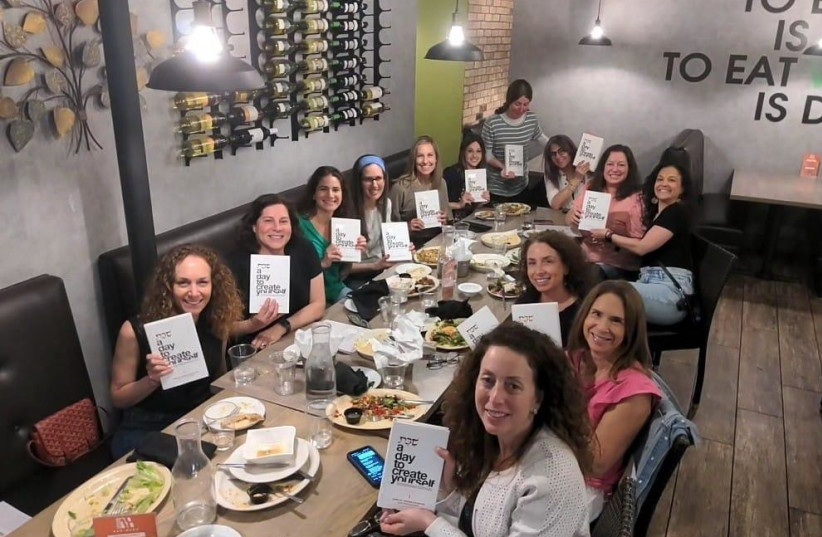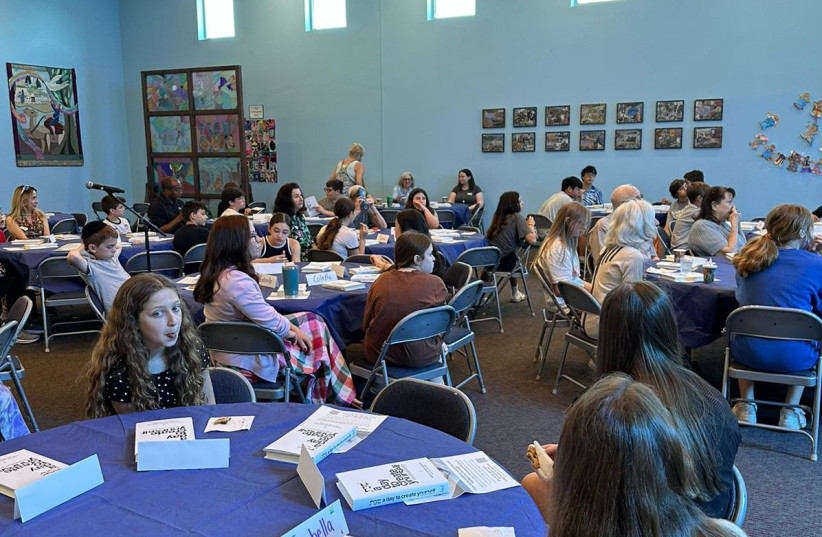One million hearts embrace Shabbat Project, Jewish values
“The greatest threat to the diaspora’s future is not antisemitism, although it must be addressed; The real threat is apathy, assimilation, and disengagement.” This powerful quote was one of many that South Africa’s Chief Rabbi Dr. Warren Goldstein told The Jerusalem Post during his recent visit to Israel.
Goldstein, a very different type of Chief Rabbi that most countries are used to, came to Israel in order to promote the Shabbat Project, a movement which he established a decade ago, but also to promote his new book, Shabbat: A Day to Create Yourself.
Goldstein has been promoting Shabbat as a core value for Jews worldwide, but takes a very down-to-earth approach; something that is very South African. Over the years, he’s interacted with celebrities, heads of state and prominent Jews from different backgrounds, something that isn’t typical for the average senior rabbi.
Goldstein’s global reach
Actress Mayim Bialik (The Big Bang Theory) recently published a video in social media, saying that “it’s not often that you get to interact with the chief rabbi of a country, but there’s a chief rabbi of South Africa, his name is Rabbi Goldstein, and I’ve gotten to speak to him. And he wrote a really, really beautiful book about Sabbath and the importance of powering down literally, physically, and also spiritually. It’s just a really awesome guidebook.”
Bialik also asked to “pay-it-forward,” and send a copy to another Jewish celebrity. “I am a huge fan of Sacha Baron Cohen and I heard that he is observant of the Sabbath,” she said of the British actor-comedian. “So I am sending him a copy of this book,” she said.
For the past ten years, the Shabbat Project has been making waves across the globe, uniting Jews from all walks of life and inspiring a deeper connection to Judaism. What began as a local initiative in South Africa in 2013 has now evolved into a powerful international movement. Goldstein played a pivotal role in spearheading this transformative project, which has brought together Jews from over 1600 cities in 100 countries.
 Group learning session in progress for (credit: COURTESY/CHIEF RABBI DR. WARREN GOLDSTEIN)
Group learning session in progress for (credit: COURTESY/CHIEF RABBI DR. WARREN GOLDSTEIN)In the early days, when the Shabbat Project was first announced, there was skepticism about whether an entire community, many of whom did not regularly observe Shabbat, could come together to keep the entire Shabbat. However, Goldstein quickly realized that there was a natural thirst for two fundamental aspects in the Jewish world: unity and the observance of Shabbat.
Goldstein: “When we announced the project in 2013, it was just for South Africa, and the intention was not to turn it into a global project. I thought it would be a lovely initiative for South Africa. We announced it in June of 2013, and the project took place in October of the same year. Initially, there was a lot of skepticism, as people doubted if an entire community, most of whom didn’t regularly observe Shabbat, could keep the entire Shabbat together. However, I found that there was a natural thirst for two things in the Jewish world: Jewish unity and the observance of Shabbat.”
“The success of the Shabbat Project lies in its organic growth and appeal,” Goldstein continues. “People were exhausted from disputes and divisions and yearned for unity. They also felt the need for Shabbat, as it brings families together and offers a deeper connection to Judaism. Shabbat empowers parents, regardless of their level of religious observance, to pass on Jewish values to their children.”
The Shabbat Project’s open-source approach has been instrumental in fostering its widespread impact, allowing volunteers and communities to adapt the resources to their needs. Goldstein elaborates: “Unlike traditional hierarchical organizations, the Shabbat Project operates as a people’s movement. It’s not about giving orders or taking commands from above. Instead, it is built on the principle that Shabbat belongs to all Jews and should be embraced and celebrated by everyone.
“The movement’s open-source approach allows volunteers and communities to use the materials and resources in ways that suit their needs best. We provide marketing materials on platforms like Canva and encourage people to use them freely, thus maintaining a flat and democratic structure. The organizing committees and volunteers are essential to the project’s success, and we treat them as partners, not employees or clients. This approach fosters trust, inclusivity, and a sense of ownership among participants, which has proven to be very effective.”
Social media has played a significant role in propelling the Shabbat Project from a local initiative to a global movement. After the first project in South Africa, videos of people participating in the event started appearing on social media platforms, capturing the attention of Jews worldwide.
Goldstein: “The power of social media became evident when videos of people participating in the Shabbat Project started circulating. This organic exposure led to interest from people around the world who wanted to be part of it too. We received hundreds of emails from different countries, expressing a desire to join the project. Instead of limiting it to individual countries, my wife and I decided to invite the whole world to participate.
“We released a video describing the project and inviting people globally to join us in the following year. The response was overwhelming, and volunteers started organizing events in their communities. From there, the movement grew and expanded to involve over 1600 cities in 100 countries.”
Fast forward to the 10th anniversary of the Shabbat Project, and the numbers are nothing short of impressive. This year, over 2,500 events have taken place worldwide, more than double the highest numbers before the COVID-19 pandemic. North America, France, and Israel have experienced significant growth, with Israel becoming the epicenter of expansion.
Goldstein: “This year’s Shabbat Project has seen an impressive increase in the number of events globally. We are currently sitting at well over 2,500 events worldwide. This is more than double the highest numbers we had before the COVID-19 pandemic. The growth has been particularly prominent in North America, where events have increased more than fivefold. France and Israel have also shown significant growth, with over 500 events each.”
And what about the number of participants? Goldstein conservatively estimates that in Israel, there were around a quarter of a million participants. Globally, if all events are considered, the number reaches approximately one million participants.
Goldstein: “Conservatively, in Israel, we’re looking at a quarter of a million participants. Globally, if we consider all events, we’re talking about approximately one million participants.”
But the Shabbat Project’s journey doesn’t end here. Goldstein has a powerful vision for the future, where Shabbat becomes the heart of Jewish life. “The vision for the Shabbat Project is to move Shabbat from the periphery to the center of Jewish society. It’s about transforming Shabbat from being just a day of rest to a day of holiness and inclusivity, where people can appreciate its beauty. This is vital for the future of the Jewish people, both in Israel and the diaspora.
“To inspire the new generation of Jews, we need to provide them with a compelling reason to be Jewish. Shabbat can be that reason as it offers a profound sense of purpose, community, and belonging. Without Shabbat at the center, I believe it’s challenging to sustain Jewish life in the diaspora. It becomes the driving force that brings Jewish values and continuity to families and communities.”
What’s next for the Shabbat Project?
In the next ten years, Goldstein envisions the Shabbat Project moving beyond being just an annual event. He aims to bring the magic of Shabbat into Jewish life every week, making it an experiential and meaningful part of people’s lives.
Goldstein: “For me, the vision for the Shabbat Project is to bring the magic of Shabbat every week. Currently, the Shabbat Project is an annual event, but we need to move towards making Shabbat a regular part of Jewish life in an experiential and authentic way. I hope to unveil a plan for this in the coming months, outlining how we can achieve this growth path.
“The annual event should be a continuous source of inspiration throughout the week, not just a standalone event. This is also a key element in my upcoming book, Shabbat: A Day to Create Yourself, which will be released in the next few weeks and months. It explores how we can take the joy and inspiration of Shabbat with us every week. Overall, I believe this transformative process can make Shabbat a vibrant reality on a weekly basis.”
 One of many learning groups for Chief Rabbi Dr. Warren Goldstein’s latest book. (credit: JASON CROUSE)
One of many learning groups for Chief Rabbi Dr. Warren Goldstein’s latest book. (credit: JASON CROUSE)Shabbat: A Day to Create Yourself is a brand-new book by Goldstein. Published as a non-profit initiative, all proceeds from the book support the Shabbat Project’s mission. Praise from prominent figures in the Jewish world underscores its importance, offering fresh insights into the essence of Shabbat and its impact on personal and societal renewal.Prominent figures in the Jewish world, including President Isaac Herzog, describe the book as illuminating and an important addition to the collective Jewish library. Actress Mayim Bialik calls it “essential for any home” and the beginning of creating peace, wholeness, and holiness. Meanwhile, Professor Dan Ariely praises the book’s “dynamic and captivating guidance,” for making positive changes in daily life.
Drawing from centuries of Jewish wisdom, the book unlocks the profound significance of Shabbat, transcending borders and uniting Jews worldwide. It calls on readers to see Shabbat with new eyes, embracing it as a transformative and life-affirming experience, empowering them to create a brighter future for themselves and their communities.





Comments are closed.